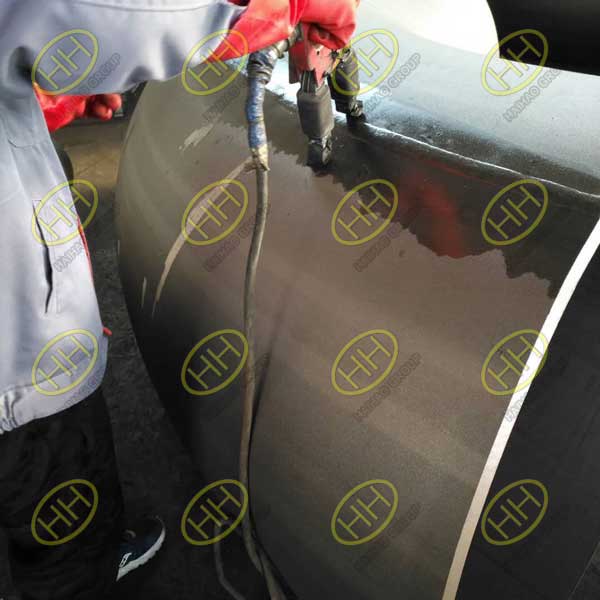Factors affecting magnetic particle testing sensitivity
Magnetic particle testing sensitivity is influenced by several factors, each playing a crucial role in the effectiveness of the inspection process. Here are some key factors to consider:
External Magnetic Field Strength:
The sensitivity of magnetic particle testing is closely related to the magnetization level of the test specimen. Generally, the external magnetic field strength must be greater than the coercive force (Hμm) of the material. Choosing a magnetic field strength greater than the point corresponding to the maximum magnetic permeability (μm) ensures better defect detection.

Magnetic particle testing for large diameter elbow welds
Magnetization Method:
To detect defects in all directions, it’s common to perform magnetization in two perpendicular directions at the same location. Different magnetization methods have varying capabilities in detecting defects along different orientations. Circumferential magnetization is more sensitive to longitudinal defects, while longitudinal magnetization is more sensitive to transverse defects.
Type of Magnetizing Current:
Different types of magnetizing currents have varying penetration depths and pulsation characteristics, thus affecting the sensitivity of magnetic particle testing. Alternating current (AC) is more sensitive to surface defects but less sensitive to near-surface defects. Direct current (DC) has greater penetration depth and is advantageous for detecting subsurface defects.
Magnetic Particle Properties:
The effectiveness of magnetic particle testing relies on the properties of the magnetic particles themselves, such as magnetic characteristics, particle size, shape, flowability, density, and contrast.
Type and Concentration of Magnetic Suspension:
The type and concentration of magnetic suspensions, such as water-based and oil-based suspensions, affect the flowability and sensitivity of the inspection process. The concentration of the suspension significantly influences the adhesion of magnetic particles to the specimen’s surface.
Equipment Performance:
Maintaining the proper functioning of magnetic particle testing equipment is essential for ensuring reliable defect detection. Any deficiencies in equipment functionality can lead to decreased sensitivity or complete testing failure.
Material, Shape, Size, and Surface Condition of the Specimen:
The material composition of the specimen, its shape, size, and surface condition all impact the sensitivity of magnetic particle testing. Surface roughness, oxidation, oil contamination, rust, etc., affect the clarity of defect indications.
Orientation, Nature, Shape, and Depth of the Defect:
The orientation of defects concerning the magnetic field direction, as well as their nature, shape, and depth, influence the sensitivity of magnetic particle testing. Defects perpendicular to the magnetic field direction are typically easier to detect.
Process Procedures:
Adhering to proper testing procedures, including surface cleaning, application of magnetic suspension, and observation, is crucial for achieving optimal defect detection. Any errors in magnetization or particle application can affect the sensitivity of defect detection.
Quality of Inspection Personnel:
The visual acuity and color perception of inspection personnel directly impact defect detection sensitivity. Well-trained and experienced personnel are essential for accurate defect identification.
Environmental Conditions:
Appropriate environmental conditions, such as adequate natural or artificial lighting, are necessary for effective defect detection. Insufficient lighting can impair the ability to discern defects, leading to reduced sensitivity.
In summary, understanding and controlling these factors are essential for optimizing the sensitivity and reliability of magnetic particle testing in flaw detection applications.As an expert in the field of pipeline systems, Haihao Group is proficient in various quality inspection methods for pipeline system products and can meet all customer requirements for product quality.

